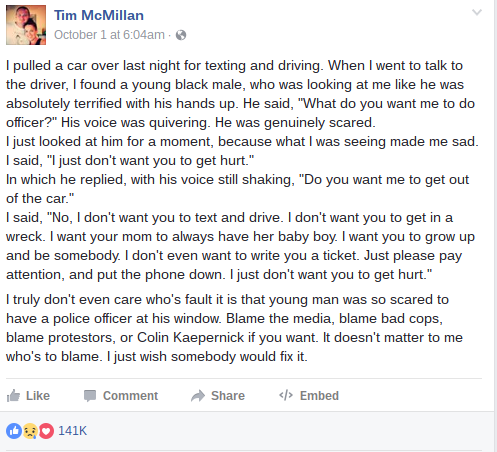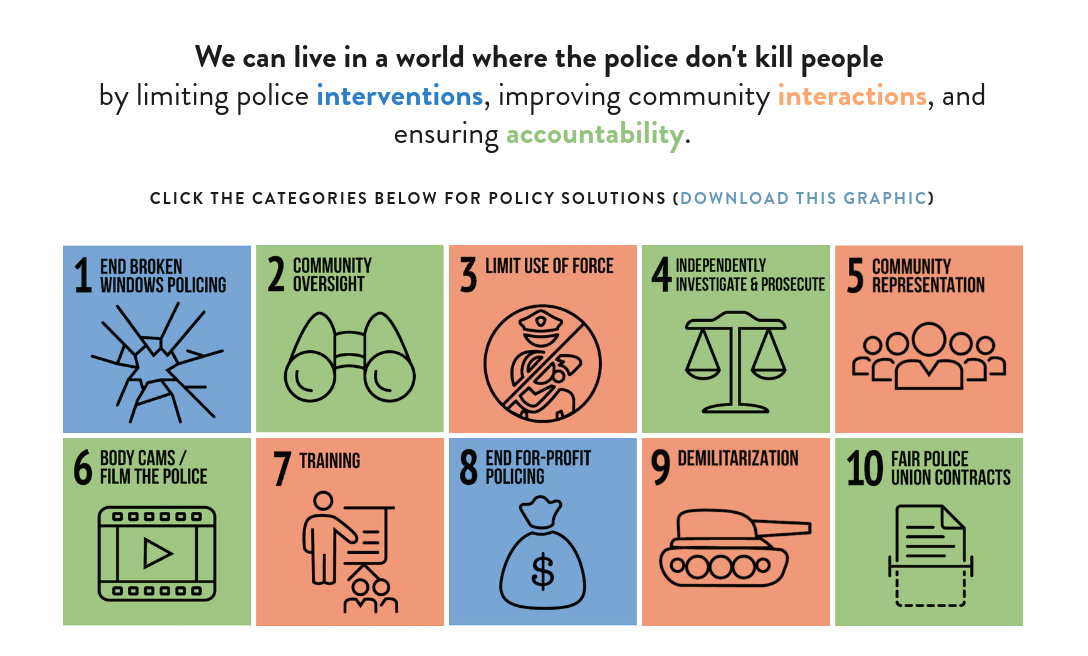Police Officer Posts About Black Man's Reaction to Getting Pulled Over

By:
A police officer's Facebook post about a black teen's fearful response to getting pulled over is shedding light on the relationship between the police and black men in the wake of numerous police shootings. And it also raises the question of how the nation can bridge this gap.
Tim McMillan, who identifies himself as a police officer in Georgia, wrote in a Facebook post that he pulled someone over for texting and driving. As soon as he went over to talk to the driver, McMillan thought the young black man appeared paralyzed with fear about interacting with the officer — perhaps because of recent widespread coverage of black men getting killed by cops, even during routine traffic stops.
 Facebook - facebook.com
Facebook - facebook.com
McMillan wrote:
"When I went to talk to the driver, I found a young black male, who was looking at me like he was absolutely terrified with his hands up. He said, 'What do you want me to do officer?' His voice was quivering. He was genuinely scared. I just looked at him for a moment, because what I was seeing made me sad. I said, 'I just don't want you to get hurt.' In which he replied, with his voice still shaking, 'Do you want me to get out of the car.'"
The Guardian's project The Counted reports that 201 black people have been killed by officers in 2016 alone. Numerous highly-publicized police killings of black people in recent years have created a cultural stain for the police force. Last year, a Gallup poll found that confidence in police was at an all-time low since 1993.
The officer wrapped up his post, which has been shared more than 100,000 times, by stating that he doesn't know how to fix the issue (though he doesn't care who you blame).
"I truly don't even care who's fault it is that young man was so scared to have a police officer at his window," he wrote. "Blame the media, blame bad cops, blame protestors, or Colin Kaepernick if you want. It doesn't matter to me who's to blame. I just wish somebody would fix it."
Working to mend the relationship between police and communities of color.
A series of solutions are part of the current discourse on policing in America. Some people have recommended requiring police officials to undergo racial bias training to eliminate any biases that police officers may have on the job. New Jersey Attorney General Christopher Porrino recently called for statewide bias training of police officers to help fight this issue.
Certain communities have embraced community policing, which entails police officers being more hands on with civilians in their everyday lives. Community policing is meant to foster positive, constructive relationships between the police community and regular people.
"Community policing is a philosophy that promotes organizational strategies that support the systematic use of partnerships and problem-solving techniques to proactively address the immediate conditions that give rise to public safety issues such as crime, social disorder, and fear of crime," the Department of Justice's Community Oriented Policing Services explains on its website.
Some people have also pushed for transparency from police departments in the wake of shooting — including the release of police dash cam footage in instances of police killings. There have also been calls for the demilitarization of police forces, along with the implementation of police body cams to increase accountability on the job. Last year, the LAPD announced plans to launch the largest body camera program in the U.S. In June, the Los Angeles City Council provided its final approval for the program and acknowledged the delay in finalizing the effort.
“The sooner we would have gotten the cameras the better,” police commissioner Steve Soboroff said at the time, according to the LA Times.
Other solutions have included decriminalizing certain offenses, such as marijuana possession. Another recommendation is to help treat mentally ill people rather than instinctively throw them behind bars. The Justice in Policing Toolkit asserts that incarceration has been wrongly used "as a one-size-fits-all" approach by police.
The organization Campaign Zero is also working to create a safer country for the black community through ten specific solutions to the problem of police killings:
 Campaign Zero - joincampaignzero.org
Campaign Zero - joincampaignzero.org
McMillan's full post is below:
Update 10/7/2016: An earlier version of this story misstated that McMillan lives in New Hampshire. This article has been updated to reflect the fact that he works in Georgia.
